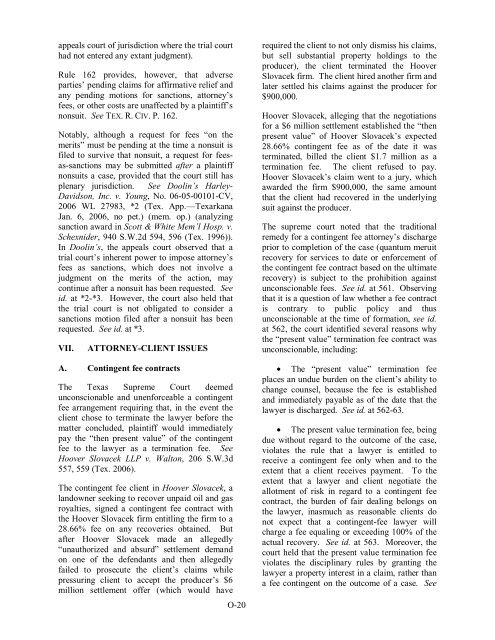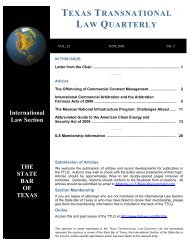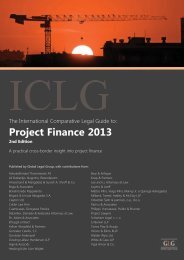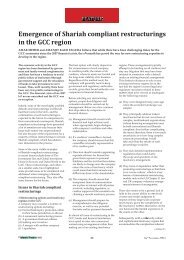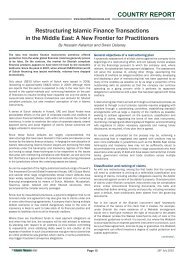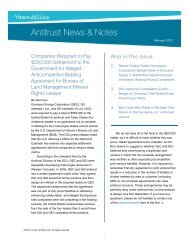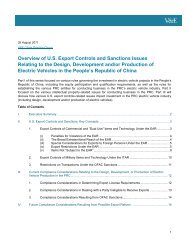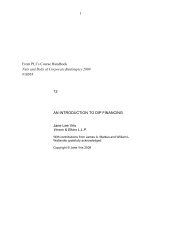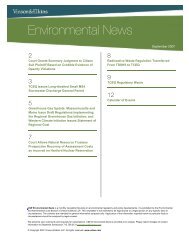Attorney's Fees Update - Vinson & Elkins LLP
Attorney's Fees Update - Vinson & Elkins LLP
Attorney's Fees Update - Vinson & Elkins LLP
You also want an ePaper? Increase the reach of your titles
YUMPU automatically turns print PDFs into web optimized ePapers that Google loves.
appeals court of jurisdiction where the trial court<br />
had not entered any extant judgment).<br />
Rule 162 provides, however, that adverse<br />
parties’ pending claims for affirmative relief and<br />
any pending motions for sanctions, attorney’s<br />
fees, or other costs are unaffected by a plaintiff’s<br />
nonsuit. See TEX. R. CIV. P. 162.<br />
Notably, although a request for fees “on the<br />
merits” must be pending at the time a nonsuit is<br />
filed to survive that nonsuit, a request for feesas-sanctions<br />
may be submitted after a plaintiff<br />
nonsuits a case, provided that the court still has<br />
plenary jurisdiction. See Doolin’s Harley-<br />
Davidson, Inc. v. Young, No. 06-05-00101-CV,<br />
2006 WL 27983, *2 (Tex. App.—Texarkana<br />
Jan. 6, 2006, no pet.) (mem. op.) (analyzing<br />
sanction award in Scott & White Mem’l Hosp. v.<br />
Schexnider, 940 S.W.2d 594, 596 (Tex. 1996)).<br />
In Doolin’s, the appeals court observed that a<br />
trial court’s inherent power to impose attorney’s<br />
fees as sanctions, which does not involve a<br />
judgment on the merits of the action, may<br />
continue after a nonsuit has been requested. See<br />
id. at *2-*3. However, the court also held that<br />
the trial court is not obligated to consider a<br />
sanctions motion filed after a nonsuit has been<br />
requested. See id. at *3.<br />
VII.<br />
ATTORNEY-CLIENT ISSUES<br />
A. Contingent fee contracts<br />
The Texas Supreme Court deemed<br />
unconscionable and unenforceable a contingent<br />
fee arrangement requiring that, in the event the<br />
client chose to terminate the lawyer before the<br />
matter concluded, plaintiff would immediately<br />
pay the “then present value” of the contingent<br />
fee to the lawyer as a termination fee. See<br />
Hoover Slovacek <strong>LLP</strong> v. Walton, 206 S.W.3d<br />
557, 559 (Tex. 2006).<br />
The contingent fee client in Hoover Slovacek, a<br />
landowner seeking to recover unpaid oil and gas<br />
royalties, signed a contingent fee contract with<br />
the Hoover Slovacek firm entitling the firm to a<br />
28.66% fee on any recoveries obtained. But<br />
after Hoover Slovacek made an allegedly<br />
“unauthorized and absurd” settlement demand<br />
on one of the defendants and then allegedly<br />
failed to prosecute the client’s claims while<br />
pressuring client to accept the producer’s $6<br />
million settlement offer (which would have<br />
O-20<br />
required the client to not only dismiss his claims,<br />
but sell substantial property holdings to the<br />
producer), the client terminated the Hoover<br />
Slovacek firm. The client hired another firm and<br />
later settled his claims against the producer for<br />
$900,000.<br />
Hoover Slovacek, alleging that the negotiations<br />
for a $6 million settlement established the “then<br />
present value” of Hoover Slovacek’s expected<br />
28.66% contingent fee as of the date it was<br />
terminated, billed the client $1.7 million as a<br />
termination fee. The client refused to pay.<br />
Hoover Slovacek’s claim went to a jury, which<br />
awarded the firm $900,000, the same amount<br />
that the client had recovered in the underlying<br />
suit against the producer.<br />
The supreme court noted that the traditional<br />
remedy for a contingent fee attorney’s discharge<br />
prior to completion of the case (quantum meruit<br />
recovery for services to date or enforcement of<br />
the contingent fee contract based on the ultimate<br />
recovery) is subject to the prohibition against<br />
unconscionable fees. See id. at 561. Observing<br />
that it is a question of law whether a fee contract<br />
is contrary to public policy and thus<br />
unconscionable at the time of formation, see id.<br />
at 562, the court identified several reasons why<br />
the “present value” termination fee contract was<br />
unconscionable, including:<br />
• The “present value” termination fee<br />
places an undue burden on the client’s ability to<br />
change counsel, because the fee is established<br />
and immediately payable as of the date that the<br />
lawyer is discharged. See id. at 562-63.<br />
• The present value termination fee, being<br />
due without regard to the outcome of the case,<br />
violates the rule that a lawyer is entitled to<br />
receive a contingent fee only when and to the<br />
extent that a client receives payment. To the<br />
extent that a lawyer and client negotiate the<br />
allotment of risk in regard to a contingent fee<br />
contract, the burden of fair dealing belongs on<br />
the lawyer, inasmuch as reasonable clients do<br />
not expect that a contingent-fee lawyer will<br />
charge a fee equaling or exceeding 100% of the<br />
actual recovery. See id. at 563. Moreover, the<br />
court held that the present value termination fee<br />
violates the disciplinary rules by granting the<br />
lawyer a property interest in a claim, rather than<br />
a fee contingent on the outcome of a case. See


